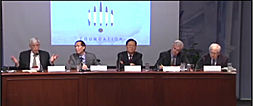Religion in the Social Transition of Contemporary China, 13-14 October 2011

Scholars from China and the United States met at the Woodrow Wilson International Center in Washington, D.C., for a two-day conference, 13 & 14 October 2011, on the topic Religion in the Social Transition of Contemporary China. The event, a collaboration of the Wilson Center’s Kissinger Institute on China and the United States and the Asia Research Center Foundation, examined “this critical and timely topic” through the varying perspectives of the distinguished participants.
“The rapid growth of religious activity in China, especially among Christians but including other religions as well, raises profound questions about the relationship of religion to government, its impact on society, and its potential effects on the emerging social challenges facing China. What are the factors shaping the Chinese approach to this critical issue? What challenges does this approach face? How might we expect it to evolve in the future? These are important questions for U.S.-Chinese relations, given the role of religion in American society and the importance attached to religious freedom in United States foreign policy.
On Day One of the conference, three panels met to discuss (1) Religion and Religious Policy in China, (2) Religious Freedom in China: Chinese and Western Perspectives, and (3) Religion and Society: A Comparison of Various Models Currently Being Practiced in the Chinese Speaking World.
On Day Two panels discussed (4) The Current and Potential Impact of Religion on the Social Transition Taking Place in Contemporary China and (5) Chinese and Western Views of the Status of Religion in Contemporary China: Common Ground or Continued Tension?
Clement Wang, Asia Research Center Foundation, moderated the concluding panel, which featured W. Cole Durham, Jr., Brigham Young University Law School, who spoke to the topic “Finding Common Ground Through Comparative Constitutional Law”; XU Yi Hua, Fudan University, whose remarks concerned “United Front and Security: Two Foci of China’s Religious Policy”; André Laliberté, Ottawa University and former Wilson Center Public Policy Scholar, who considered “The Communist Party and the Religious Plurality of China”; and CHOU Fu Chu, National Central University, who explored “Some Indigenous Models of Church-State Relationships in the Context of 21st Century Chinese Society.”
Other scholars participating were J. Stapleton Roy and Douglas G. Spelman of the Kissinger Institute; Caleb K. Zia and Christopher Wilde of the Asia Research Center Foundation; LIU Peng, ZHENG Xiaoyun, and ZHUO Xinping, Chinese Academy of Social Sciences; LI Xiangping, East China Normal University; LI Ling (Daniel), Shanxi Normal University; Michael Nai Chiu Poon, Trinity Theological College; TAI Yiu Ting (Benny), The University of Hong Kong; WANG Ambroise Aiming, Nanjing Union Theological Seminary; WANG Xiaochao, Tsinghua University; WU Yungsheng (Ezra), Ming Chuan University; ZHANG Shoudong (John), China University of Political Science and Law; strong>ZHANG Zhigang, Peking University; Brian Grim, Pew Research Center’s Forum on Religion & Public Life; J. Gordon Melton, Institute for the Study of American Religion; Thomas F. Farr, Georgetown University; and John Hanford, former U.S. Ambassador-at-Large for International Religious Freedom.